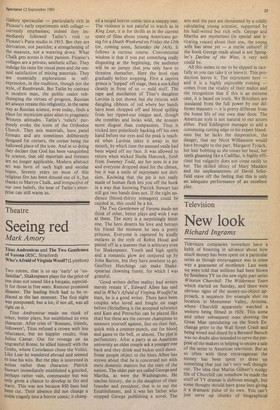Theatre
Seeing red
Mark Amory
Titus Andronicus and The Two Gentlemen of Verona (RSC, Stratford) Who's Afraid of Virginia Woolf? (Lyttelton) Two rotten, that is to say 'early' or 'unfamiliar', Shakespeare plays for the price of one does not sound like a bargain, especially for those in free seats. Rumour promised disaster. The leading bitch had to be replaced at the last moment. The first night was postponed; but a lot, if not all, was all right on it.
Titus Andronicus made me think of Other, better plays, but established its own Character. After cries of 'Romans, friends, followers', Titus refused a crown with less reluctance, but no happier results, than Julius Caesar. Out for revenge on an ungrateful Rome, he allied himself with the Goths, where Coriolanus chose the Volsci. Like Lear he wandered abroad and seemed to lose his wits. But the play is interested in action rather than character. Patrick Stewart immediately established a grizzled, Perhaps rather vain, commander but was only given a chance to develop in fits and starts. This was not because 850 lines had been cut. Their absence did not change a noble tragedy into a horror comic; it chang ed a turgid horror comic into a snappy one. The violence is not painful to watch as in King Lear, it is for thrills as in the current spate of films about young Americans going for a Death Weekend on Friday the 13th (or, coming soon, Saturday the 14th). It follows a curious course. Conventional wisdom is that if you put something really disgusting at the beginning, the audience will be so jumpy that you only have to threaten thereafter. Here the level rises gradually before stopping. First a captive prince is 'lopped' off stage, then a son killed cleanly in front of us — mild stuff. The rape and mutilation of Titus's daughter Lavinia is not shown but she returns with dangling ribbons of red where her hands have been chopped off and blood spilling from her ripped-out tongue and, though she trembles and looks wild, she arouses more disgust than compassion. Titus is tricked into pointlessly hacking off his own hand before our eyes and the peak is reached when Lavinia takes it away in her mouth, by which time the amused smile had been wiped off my face. It was allowed to return when wicked Sheila Hancock, fresh from Sweeney Todd, ate her sons in a pie and everyone dropped dead for the climax, but it was a smile of enjoyment not derision. Knowing that the pie is not really made of human flesh lets you off the hook in a way that knowing Patrick Stewart has still got two hands does not. If the right audience (blood-thirsty teenagers) could be cajoled in, this could be a hit.
The Two Gentlemen of Verona made me think of other, better plays and wish I was at them. The story is a surprisingly bitter one. The hero deserts his love and betrays his friend the moment he sees a pretty princess. Everyone is captured by kindly outlaws in the style of Robin Hood and paired off in a manner that is arbitrary even for Shakespeare. Youth and high spirits and a romantic glow are conjured up by John Barton, but they have nowhere to go. Geoffrey Hutchings can make Shakespearian clowning funny, for which I was grateful.
'Good writers define reality; bad writers merely restate it', Edward Albee has said and in Who's Afraid of Virginia Woolfe?at least, he is a good writer. There have been couples who loved and fought on stage before (Strindberg is the accepted reference and Kate and Petruchio can be played like that) but these are the current champions to measure yourself against, fast on their feet, quick with a counter-punch, out for blood and game to the bell, or almost. The plot is perfunctory. After a party at an American university an older couple ask a younger one back and they drink and bicker until dawn. Some people object to the hints Albee has strewn about that he is concerned not with mere domestic matters but the state of the nation. The older pair are called George and Martha, as were the Washingtons. He teaches history, she is the daughter of their founder and president, that is to say the Establishment, and it was her father who stopped George publishing a novel. The arts and the past are threatened by a coldly calculating young scientist, supported by his half-witted but rich wife. George and Martha are mysterious (in special and irritating voices) about their son, the young wife has none yet — a sterile culture? If the book George reads aloud is not Spengler's Decline of the West, it very well could be.
All this seems to me to be slipped in tactfully so you can take it or leave it. This production leaves it. The enjoyment here — and it is a highly enjoyable evening — comes from the vitality of their malice and the recognition that if this is an extreme case, it is based on truth. We Britishers are insulated from the full power by our different manners — it is pretty different from the home life of our own dear dons. The American style is not natural to our actors either. Paul Eddington manages to add a convincing cutting edge to his expert blandness but he lacks the desperation, the danger, that say Nicol Williamson would have brought to the part. Margaret Tyzack, her hair bobbing as she tosses her head, her teeth gleaming like a Cadillac, is highly efficient but vulgarity does not come easily to her. The skilled idiocy of Mary Maddox and the unpleasantness of David Schofield stave off the feeling that this is only an adequate performance of an excellent play.
































 Previous page
Previous page